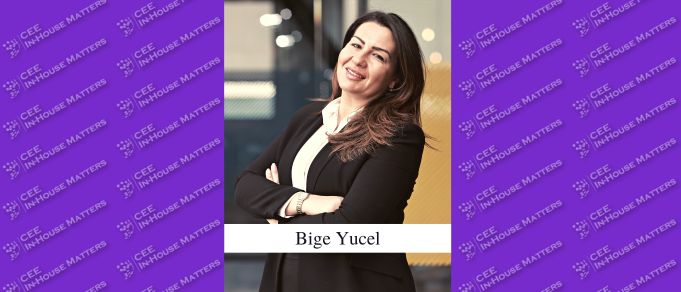Siemens Turkiye Lead Country General Counsel Bige Yucel talks about her in-house legal team’s current and upcoming focuses.
CEELM: Can you walk us through your career to date?
Yucel: I have been the Lead Country General Counsel and Board Member of Siemens Turkiye for the past three years. Before Siemens, I worked for 18 years as a lawyer in Turkish law firms and represented multinational and Turkish clients. Fifteen years of these were with Herguner Bilgen Ucer, where I focused on dispute resolution and employment law, with primary emphasis on collective negotiations, trade union affairs, industrial restructurings, and white-collar crime. I really enjoyed being at courthouses, in meeting rooms full of trade union representatives, or in conference rooms for arbitration proceedings and never deemed them as the final destination, but only as a school. Indeed, all these prepared me well for my current in-house role and made a remarkable contribution to my professional life on the business side.
Apart from my position as the General Counsel at Siemens, I am the Vice President of the German-Turkish Chamber of Industry and Commerce (AHK). I am leading the Women in Business Working group of the AHK. Siemens has taken bold steps towards sustainability by introducing the House of Sustainability approach, comprising the DEGREE framework (Decarbonization, Ethics, Governance, Resource Efficiency, Equity, Employability). I am proud to lead the Equity group and our mission to drive diversity in business life.
CEELM: After 18 years in law firms, how did you make the transition? What was the biggest challenge and the biggest surprise during the switch to the in-house life?
Yucel: Rather than a challenge, it was a pleasure to make this switch! The significant amount of time I spent in law firms was a key asset that facilitated my transition. Moreover, having worked with multinational companies, I had a deep understanding of their priorities, how they function, what their daily operations look like, as well as their decision-making processes. Working at Siemens wasn’t so much of a challenge as much as it was a delightful transition to collaborating with the business team of one such multinational corporation.
One of the good parts of being an in-house consultant is being able to closely monitor the outcome of your advice. When advising a client at an external law firm, you often don’t have the opportunity to witness even the short-term effects and outcomes of your advice on a company. On the flip side, at Siemens, I had the opportunity to witness the outcomes and impacts of consultancy and legal efforts, which proved to be an enriching learning experience for me. It was truly invaluable to be a member of such a vast organization that has operated across the globe for over 175 years.
CEELM: How large is your team right now, and how is it structured?
Yucel: Siemens AG has a large and experienced legal and compliance community. In Turkiye, Siemens AG’s regional company is Siemens Sanayi ve Ticaret A.S. Within this entity, we have a team of six. In addition to this, Siemens AG has various subsidiaries in mobility, financial services, and many other areas in which the company operates. Siemens Turkiye, specifically, has around 15 team members in legal and compliance roles.
CEELM: How do you decide what work to delegate, and how do you choose the external counsel you’ll be working with?
Yucel: The decision to delegate depends on the content and complexity of the legal query at hand. We have a well-furnished and experienced in-house team, which allows us to handle several matters in parallel within a short timeframe. We have some essential rules in place, one of which is that we do not directly involve ourselves in litigation matters – instead, we outsource representation to external offices.
For areas such as competition law, data privacy, and employment law, where we have in-house experts, we typically handle these matters internally. We seek the support of our external colleagues only when we require insights into best practices in the market, court precedents, or recent events that may impact our operations, making our work more efficient. We consider the experience of the local law firms but also seek a good command of multi-linguistic reporting and communication.
When selecting external counsel, we initially consider a panel list of law firms that Siemens AG collaborates with globally. Additionally, we have local panel firms that are region-specific, chosen based on their knowledge, experience, and overall capacity. Our primary focus is on engaging law firms and legal experts who can provide precise advice promptly and without communication barriers. This year marks Siemens’ 167th year of operation in Turkiye, which translates to a deep reservoir of knowledge and experience that enables us to be agile and precise in our decision-making.
CEELM: What has been keeping you busy recently and what do you foresee as being the primary driver of work for the next 12 months?
Yucel: Currently, our focus is primarily on regulatory matters. The EU sanctions on Russia have generated a significant workload in our contract and claim management. Additionally, recent developments in competition law and data privacy in Turkiye have been demanding a lot of attention from our team. The legislative and judicial authorities in Turkiye and the EU often have asynchronous agendas, which requires us to regularly review and adapt our general operational principles.
As a former litigator, I’m pleased to note that we have been successful in keeping our lawsuit levels low. This success is also attributed to the strong collaboration of our business teams and contract management professionals.
In the coming year, regulatory matters will continue to be a significant focus for us, particularly in the areas of competition law, data privacy, and potential implications arising from EU sanctions on Russia. We do not have many cases or proceedings related to receivable collections due to proper collateral models being in place, so litigation and disputes are not expected to be a heavy burden on our workload.
CEELM: What would you say are the main challenges for GCs in Turkiye right now?
Yucel: Digitalization and AI are the chief challenges that have been dominating discussions among legal professionals lately. Siemens is dedicated to using digital transformation to make a positive impact on the world and Turkiye. We make cyber security our top priority and confidently implement our in-house developed digital tools as part of our legal and compliance initiatives. However, we often encounter a significant level of hesitation from our external legal and business partners. People appear to be apprehensive about losing their standing in the market, and they are not always motivated to adapt to these new technologies.
If you ask the opinion of a middle-aged lawyer in Turkiye about ChatGPT, they would likely list at least ten concerns about it, while overlooking the potential benefits it could offer and the type of regulation that could optimize its impact on the market. Nevertheless, there is a real added value to be gained here, and in my opinion, all legal practitioners should focus on AI-driven topics, emphasizing opportunities over obstacles and reservations.
This article was originally published in Issue 10.9 of the CEE Legal Matters Magazine. If you would like to receive a hard copy of the magazine, you can subscribe here.


